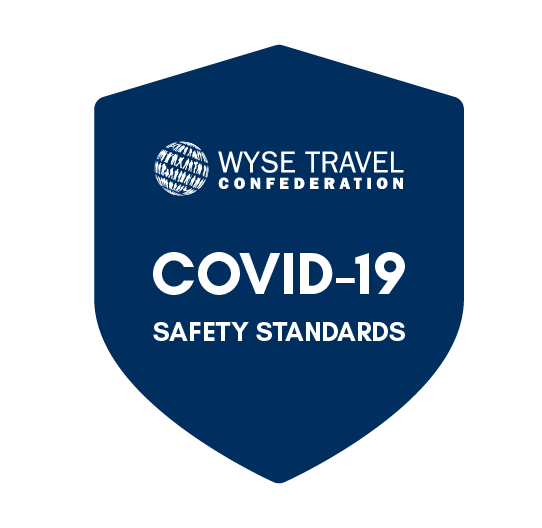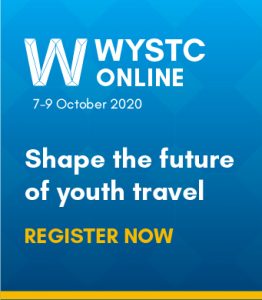News
Manchester, United Kingdom — 22-25 September 2009WYSE Archives
![]()
How hostels are ensuring guests’ safety with the WYSE COVID-19 safe accommodation self-declaration
By definition, hostels are social spaces. An unrivalled choice for young people looking for budget-friendly accommodation and solo travellers keen to meet new friends and explore a destination. The onset of a virus that has swept across the globe, and seems to be here to stay for the foreseeable, has challenged the typical hostel model, posing the question: How can hostels ensure the safety of their guests?
There is no script for post (or mid)-pandemic travel, but the youth travel accommodation sector has demonstrated how its quick-thinking and ability to adapt spaces, services and processes to meet new health and safety guidelines is allowing properties to slowly start to welcome guests once again.
To support accommodation providers that have put in place new procedures to ensure the wellbeing and peace of mind of staff and guests, WYSE Travel Confederation has created a COVID-19 safe accommodation declaration. This self-declaration allows individual property operators as well as group property operators, both members and non-members, to declare that they adhere to local and national standards of operating, as well as to WYSE Travel Confederation’s standards of guest care. These standards focus on the following:
- Cleanliness, including regular disinfection of high touch surfaces, hand washing and deep cleaning of shared spaces
- Health protection of staff and guests, including installation of protective screens in reception areas
- Social distancing, ensuring that guests are aware of the social distancing guidelines of the property
- Contact-free transactions
To guarantee the validity of these declarations, WYSE Travel Confederation carries out spot checks on a weekly basis. If an accommodation provider is not able to commit to the required standards, it will be removed from the scheme.
Organisations around the world, ranging from Hostelling International to hostel groups including MEININGER, St Christopher’s Inns, Abrahams and JO&JOE have already completed the declaration. Currently the declarations represent nearly 50,0000 beds around the world.
Louise Garner, Commercial Director of Clink Hostels says:
“When it came to welcoming guests to ClinkNoord, our largest hostel with 835 beds, we were at first a little overwhelmed with how we would implement COVID-19 measures throughout the building. Our super Clinkees (team members) came to the rescue by building fun to use hand sanitising stations, creating visually–grabbing informational signage for our international audience to understand, measuring distances between beds, creating one–way systems in the hostel to keep both themselves and our guests safe and still be able create travel memories during this unusual time. Thanks to these measures, we have held socially–distanced events including art workshops, glow in the dark yoga, karaoke and had live music in the last few months. COVID-19 will not change our mission of bringing people and places together!
We used the WYSE COVID-19 safe accommodation declaration to ensure that all areas of our hostel operation were ready to accept guests, together with adhering to local government guidelines. From visiting our website, to check–in and having a great time at our hostels, it was important for us to make sure that our guests and team members were educated on COVID-19 regulations and to understand what procedures have been put in to place to keep them safe. I would highly recommend this as an excellent check list for hostel companies to review.”

By definition, hostels are social spaces. An unrivalled choice for young people looking for budget-friendly accommodation and solo travellers keen to meet new friends and explore a destination. The onset of a virus that has swept across the globe, and seems to be here to stay for the foreseeable, has challenged the typical hostel model, posing the question: How can hostels ensure the safety of their guests?
There is no script for post (or mid)-pandemic travel, but the youth travel accommodation sector has demonstrated how its quick-thinking and ability to adapt spaces, services and processes to meet new health and safety guidelines is allowing properties to slowly start to welcome guests once again.
To support accommodation providers that have put in place new procedures to ensure the wellbeing and peace of mind of staff and guests, WYSE Travel Confederation has created a COVID-19 safe accommodation declaration. This self-declaration allows individual property operators as well as group property operators, both members and non-members, to declare that they adhere to local and national standards of operating, as well as to WYSE Travel Confederation’s standards of guest care. These standards focus on the following:
- Cleanliness, including regular disinfection of high touch surfaces, hand washing and deep cleaning of shared spaces
- Health protection of staff and guests, including installation of protective screens in reception areas
- Social distancing, ensuring that guests are aware of the social distancing guidelines of the property
- Contact-free transactions
To guarantee the validity of these declarations, WYSE Travel Confederation carries out spot checks on a weekly basis. If an accommodation provider is not able to commit to the required standards, it will be removed from the scheme.
Organisations around the world, ranging from Hostelling International to hostel groups including MEININGER, St Christopher’s Inns, Abrahams and JO&JOE have already completed the declaration. Currently the declarations represent nearly 50,0000 beds around the world.
Louise Garner, Commercial Director of Clink Hostels says:
“When it came to welcoming guests to ClinkNoord, our largest hostel with 835 beds, we were at first a little overwhelmed with how we would implement COVID-19 measures throughout the building. Our super Clinkees (team members) came to the rescue by building fun to use hand sanitising stations, creating visually–grabbing informational signage for our international audience to understand, measuring distances between beds, creating one–way systems in the hostel to keep both themselves and our guests safe and still be able create travel memories during this unusual time. Thanks to these measures, we have held socially–distanced events including art workshops, glow in the dark yoga, karaoke and had live music in the last few months. COVID-19 will not change our mission of bringing people and places together!
We used the WYSE COVID-19 safe accommodation declaration to ensure that all areas of our hostel operation were ready to accept guests, together with adhering to local government guidelines. From visiting our website, to check–in and having a great time at our hostels, it was important for us to make sure that our guests and team members were educated on COVID-19 regulations and to understand what procedures have been put in to place to keep them safe. I would highly recommend this as an excellent check list for hostel companies to review.”


